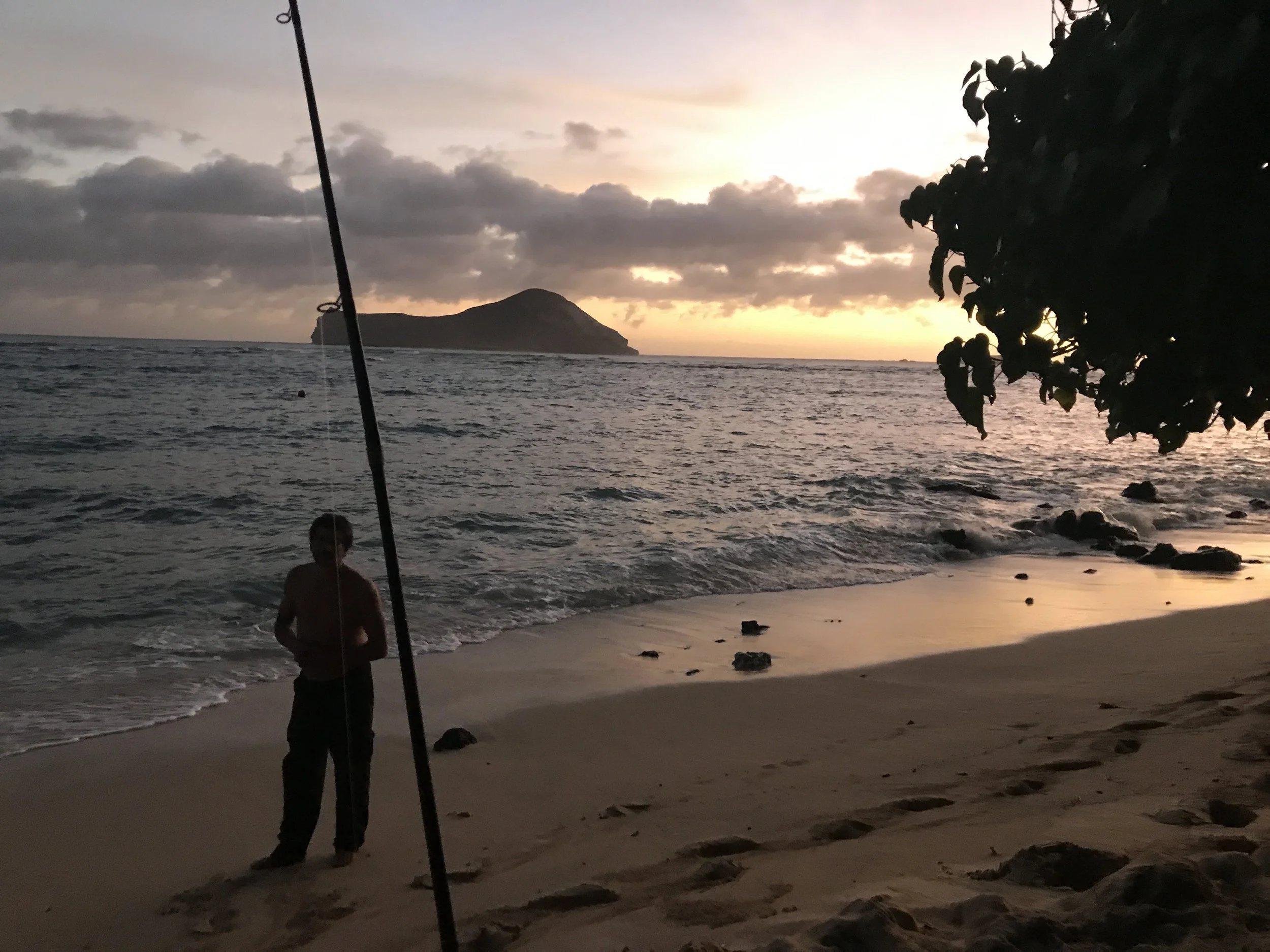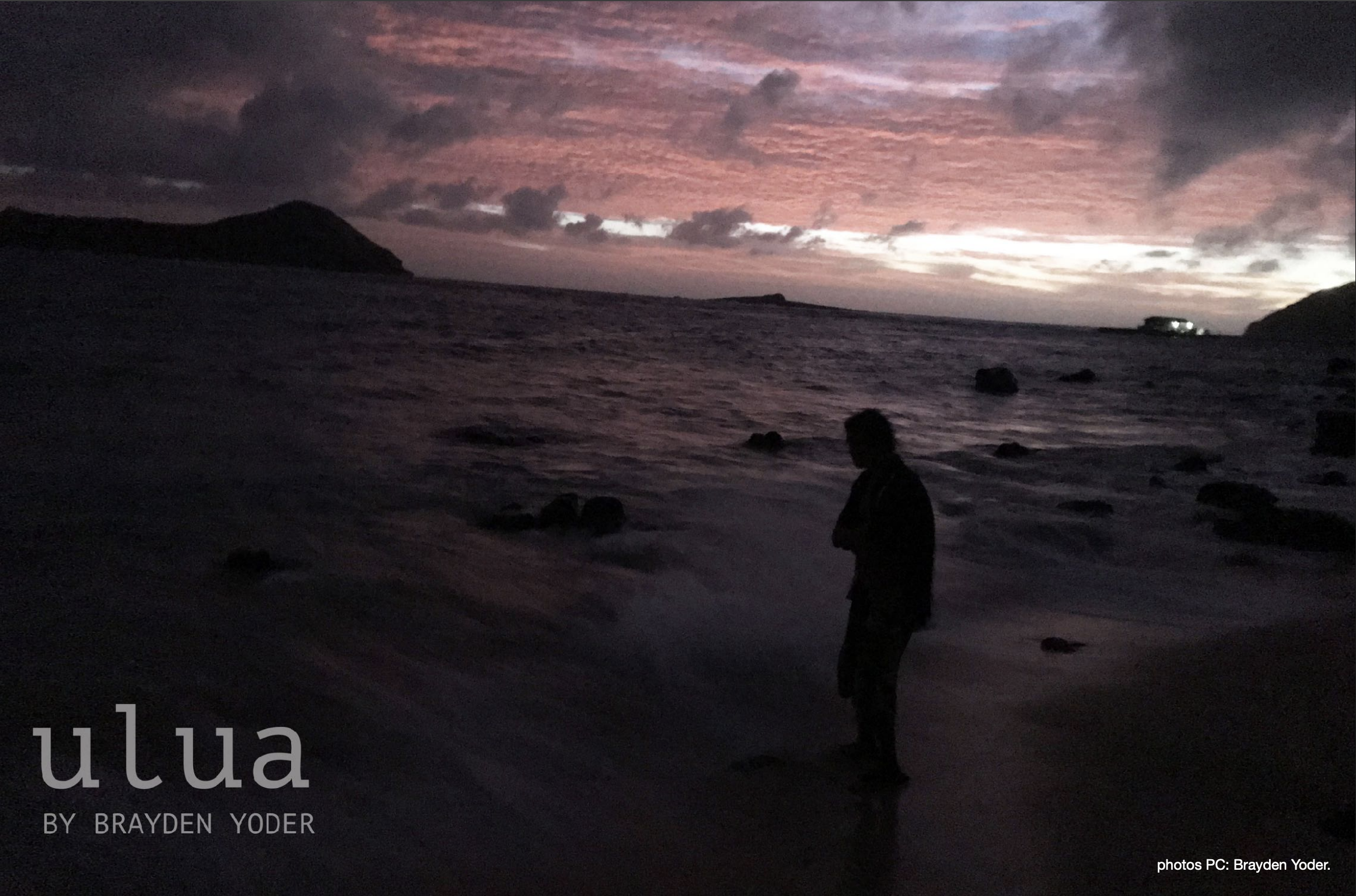ULUA
Short Film
Project Type: Short Film
Project Status: Pre-Production
Writer, Director, Producer: Brayden Yoder
Producer, Lead Actor: Tui Asau
Cinematographer and Producer: Chapin Hall
Casting Director: Akemi Nakagawa Bischoff
LOGLINE
When his fiancée prevails on him to sell off the biggest catch of his life, a homeless fisherman gets caught between his proud encampment of starving addicts and the determined mother of his child, who wishes to rejoin the grid and reclaim their son.
SYNOPSIS
On a far-flung beach on Oʻahu’s verdant windward side, a homeless fisherman finds his fortune the morning he reels in a giant ulua. Yet this feverish dream-come-true faces a ferocious reality when he reneges on feeding it to his encampment of meth addicts. After his fiancée prevails on him to instead bring his catch to market, a fault line opens between them over her fierce desire to rejoin the city and his newfound pride in living off-the-grid.. For Ata, the fisherman, his power flows from his skills with a hook-and-line.
Living off the land, refusing to play by society’s rules, he soaks up the adulation he receives from the others on the beach, who marvel every time Ata hauls in a big catch. In this homeless community cut off from the city, Ata feels a sense of empowerment otherwise denied him by the powers-that-be. He revels in his free agency and knows how precariously his state of grace exists on the outside. For Kanoe, Ata’s fiancée, every day spent on this beachfront hell is another day away from her court-removed child. Tethered to her tent, she wiles her time under a cloud of drugs to numb the pain, waiting for a rainbow that seems further and further away.
She serves as the narrator of this cautionary tale, clinging to the dream of a day when she and Ata could move from homeless to home-dwellers and be reunited with their young son. But she tires of reminding Ata that this is his dream too. As the hungry mouths of their community demand tribute, a fault line opens between Kanoe and Ata, one which threatens to swallow their relationship whole. Caught between his proxy family in the forest and Kanoe’s vision of a life of convention, Ata tries to placate both sides – until his prized fishing pole turns up missing. Faced with this threat to his livelihood, the fisherman must choose whom to trust: the mother of his court-removed child, or the community that nurtures his addictions
DIRECTOR’S STATEMENT ABOUT THE PROJECT
Ulua is the reason I wanted to become a filmmaker. Since my screenwriting school days, I've looked for a lens through which to portray my family's trauma, and help my brother reconcile with the court-removed son from whom he is sadly still estranged. His homelessness and drug addiction complicated both matters; every time I thought he might turn a corner, he disappeared down another alley. For eight years, my parents cut off contact with my brother, who blew from one homeless encampment to the next like plastic refuse floating down the windward coastline.
That I stayed in touch with him in all that time could be chalked up to either a surfeit of empathy, or a remarkable case of middle-child syndrome. But as I came to visit those spots he called home, I acquired a better understanding of a world just outside our front door, a place where, as he puts it, “everyone I know is on drugs.”
The advent of my last film, Last Taxi Dance, produced on location in Honolulu, helped to facilitate a reconciliation between my parents and my brother, and let me gain his trust in telling this story. Ulua is not autobiographical and the character of Ata is not my brother. But the pain is the same, and its world is as real as a rock of crystal. Stories like Ulua represent the best of what independent cinema can offer, calling the audience into a world of suffering and healing.
Far from commercialism, I would hope for Ulua to make a contribution to our collective consciousness by offering a window onto a world of Hawaiian homelessness unfathomed just outside all of our front doors. I would hope families like ours might come to know more of how their own prodigal son or daughter survives on the streets and that our county might reflect on the dark undercurrents of capitalism, which gobbles up the land and pushes our neighbors to our island’s literal edge. Above all, I would hope our audience might reckon with the human toll it takes on those whom society views like trash
Meet The Filmmakers
-
Brayden Yoder
Writer, Director, Producer
Born and raised on O’ahu to a white father and an Indonesian immigrant mother, Brayden Yoder is a writer, director and producer with a passion for storytelling across cultures. His most recent film, the wartime clash-of-cultures tale of Last Taxi Dance, enjoyed an award-winning festival run before its national debut on PBS digital platforms over Memorial Day weekend 2020 through Pacific Islanders in Communications.
A former soldier, Brayden is a graduate of the Writers Guild Foundation’s Veterans Writing Project as well as a Creative Lab Hawaiʻi fellow for both screenwriting and producing. Upon leaving the army, he went on to study screenwriting at the University of Technology, Sydney and direction at the national Film & Television Institute of India, experiences he credits with further exposing him to the wider world and finding him a voice on veterans issues and cultural understanding.
Upon returning home, Brayden founded Clearing Barrel Productions as an independent, veteran-owned company dedicated to telling stories that challenge, inspire, and entertain through the media arts. As an Iraq War veteran, he believes in the healing properties of narrative, and the importance of providing outlets for trauma. He is based between Los Angeles and his beloved hometown of Honolulu.
-
Tui Asau
Producer, Lead Actor “Ata” Tui
Asau is a multifaceted Polynesian actor, writer, director, and producer based in Los Angeles and Hawaiʻi. Living throughout the South Pacific as a child, his family took root in Kailua-Kona on Hawaiʻi Island, where he graduated from Kealakehe High School. As an actor, Tui has starred in several independent films, notably the internationally acclaimed The Haumāna, directed by the late Keo Wooford. He has also appeared in numerous television shows such as NCIS LA, NCIS Hawai’i, Magnum P.I. and Criminal Minds.
On stage, he has performed at the Ojai Playwrights Conference as part of “The Intersection.” As Co-Founder of Lineage Entertainment Group, Tui has produced and starred in multiple pieces for the web and stage. As a mentor, he teaches acting in downtown Los Angeles in partnership with Homeboy Industries, along with writing and spoken word in Orange County Juvenile Hall.
-
Chapin Hall
Cinematographer and Producer
Straddling the worlds of narrative and documentary filmmaking, Chapin is a Honolulubased cinematographer. His most recent feature, the ARRAY + Google Feature Film Grant-winning Molokaʻi Bound, enjoyed its world premiere at the Seattle International Film Festival in 2025.
His previous feature, Everyday in Kaimuki, premiered in 2022 at Sundance where his award-winning short about the protests atop Mauna Kea, This is the Way We Rise, also played the previous year in 2021. Chapin's concern for and immersion into Honolulu’s “At Risk” populations can be seen both in Out of State, as well as in his 2017 online featurette on homelessness for The Guardian’s “Outside in America” series.
-
Akemi Nakagawa Bischoff
Casting Director
Born and raised in Tokyo, Akemi Bischoff is an Oʻahu-based casting director who specializes in "street casting" of new and unique faces. Her recent credits include Patty Jenkins’ TNT network feature I Am the Night, as well as the local independent features I Was A Simple Man, Waikiki, Go For Broke, A Midsummer’s Hawaiian Dream and the Japanese feature Hanalei Bay.Akemi first arrived in Southern California as an exchange student at the age of fifteen, before going on to work in Los Angeles as an actor. She traces her passion for casting diverse faces on the big screen to her own experiences as a working actor in the lessdiverse Hollywood of the 1980s & 90s.
Your Help
ULUA is a fiscally sponsored project of Cinematography for Actors, a 501(c)(3) nonprofit organization. Your donation will be tax-deductible!



